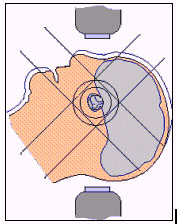When is radiotherapy used?
- Reduce the size of pituitary tumors
- Prevent further growth of pituitary tumours
- Post-operatively to markedly decrease the chance of symptomatic tumour recurrence
- Reduce excessive hormone secretion (such as growth hormone or ACTH).
How is radiotherapy given?

A clear plastic mask made specially for each patient’s head, holds the patient’s head still during the brief treatment. The targeting marks are lined up against the cross-beams of a laser set into the walls of the radiotherapy room. The radiotherapy treatment is delivered to the target area from three directions
What are the side effects?
- Short term
- Hair Loss: Some hair loss occurs at both sideburn areas (temples) temporarily which can be covered by scalp hair
- Tiredness: Tiredness during and after treatment is quite normal. A good balance between activity and rest may actually help the feeling of tiredness
- Long term
- Hypopituitarism
- Due to irradiation of hypothalamus leading to decreased releasing hormones
- Order of development is loss of GH followed by Gonadotropins, ACTH & TSH
- Visual impairment
- Radiation oncogenesis
Othere forms of radiotherapy
Local forms of radiotherapy – advantages are that a focused beam on the tumor with minimal damage to adjacent tissue
1. Gamma knife radiotherapy
- The Gamma Knife offers a non-invasive alternative for many patients for whom traditional brain surgery is not an option.
- Gamma Knife surgery removes the physical trauma and the majority of risks associated with conventional surgery.
- This effective single session treatment may require an overnight hospital stay, but is often done in an outpatient surgical setting with periodic follow-up.
- It has been proven safe over the long term and is recognized and covered by insurance plans. Based on preoperative radiological examinations, such as CT scans, MR scans and angiography, the unit provides highly accurate irradiation of deep-seated targets, using a multitude of collimated beams of ionizing radiation with scalpel-like precision.
- With the Gamma Knife, a surgical incision is not required; the attendant risks of open neurosurgical procedures (hemorrhage, infection, cerebrospinal fluid leakage, etc.) are therefore avoided
- Gamma-knife surgery is effective at stopping the abnormal hormone secretion that can occur from these tumors.
- Gamma-knife radiosurgery doesn’t have immediate results. Weeks, months, or even years, may pass before the effects of the treatment become apparent.
- Progress is monitored through follow-up imaging studies
2. Linear accelearator focal radiotherapy
- Radiosurgery can be preformed with linear accelerator machines.
- Radiosurgery is a one session surgical procedure directed by a neurosurgeon and a radiation oncologist.
- The total procedure occurs in one day from immobilization, scanning, planning and the procedure itself.
- With radiosurgery, the radiation dose given in one session is usually less than the total dose that would be given in radiation therapy
- This is important as higher radiation to surrounding areas when a person is given a few (2-5 treatments) may result in more side effects, some of which may be permanent.
- More importantly, the effect on a tumor of a reduced amount of radiation with each treatment versus a very high one time dose, can result in less tumor control and poorer outcomes than radiosurgery.
This article is prepared along with Dr Menaka